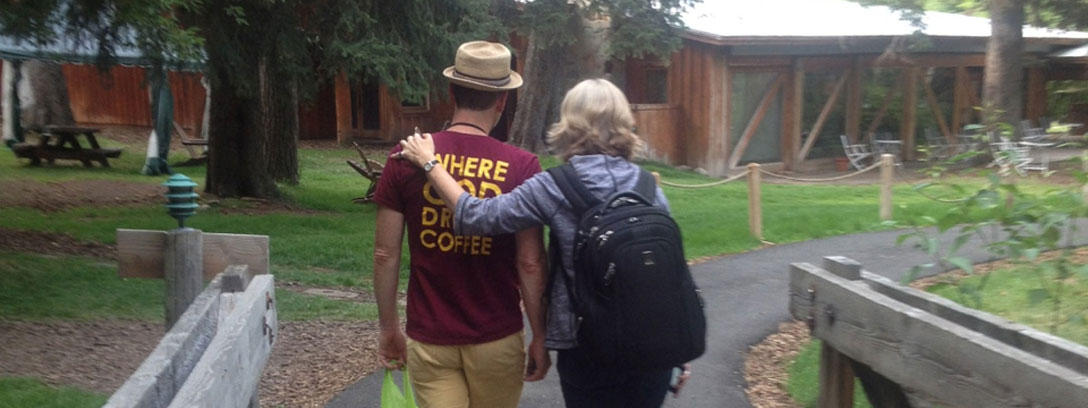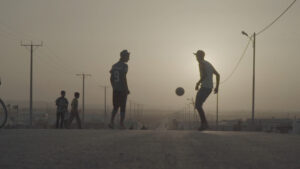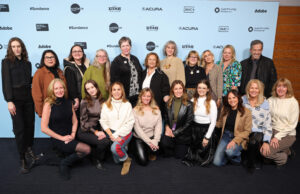Lisa Peterson, Denis O’Hare, and creative advisor Janice Paran | Photo by Jonathan Hickerson © Sundance Institute
Denis O’Hare and Lisa Peterson
Denis O’Hare and Lisa Peterson recently wrapped up their work at the three-week Theatre Lab at Sundance Resort where they rehearsed, revised, and rewrote parts of their in-progress play The Good Book. The play tells the story of how the Bible became the most powerful collection of texts in human history. Below, the writing duo discuss their sources of creative inspiration for sundance.org.
We were asked by Sundance to respond to the following question: “Identify the music, writing, art, or other relevant work that has inspired you, along with a brief account of how it has shaped your creative identity.” Of course, like all good artists, we didn’t exactly follow the directions. We decided to do it a little like an interview. And since we often work by Skype or email, this is what it feels like. Here’s what we came up with.
Lisa Peterson’s Picks
Fantasia (the Disney film)
Denis: When did you first see it? Who did you see it with? How old were you? What are the one or two things that stood out to you about Fantasia? How do you think it affected the way you write/see the world?
Lisa: Oh, I was tiny—like maybe 6? 7? The crazy shifts, like from the dancing elephants—so fun! And the sorcerer’s apprentice, which scared me.
Caryl Churchill’s plays
Denis: Where and when did you see it? Did these plays surprise you or scare you or upset you in any way? Did you want to direct them? What about them was the most revolutionary for you?
Lisa: I think I saw the first New York City productions of both. I remember them as raw but also very theatrical, colorful. Nothing like a movie or any other art form. Big ideas, but expressed with such theatrical freedom.
Picasso’s ‘Guernica’
Denis: What was your absolute first reaction when you came into the room with it? What do you think it means? Have you ever tried to paint?
Lisa: When I came around the corner, it hit me like a wave knocks you down in the ocean. It’s in Madrid, I think in the Reina Sofia. And the weird thing is, it’s a kind of small room, so you’re standing, oh, maybe six feet away. You can’t get back from it. And it’s violent but also beautiful. Somehow he puts you smack in the battlefield. But with such abstraction. And no, I never have painted—that’s a good question.
The Pacific Ocean
Denis: Do you like to swim? Are you scared at all of sharks and other sea creatures? Have you ever been scuba-diving? Have you ever surfed? What is your favorite thing to do in the Pacific Ocean? How exactly does the Pacific Ocean inspire you?
Lisa: Just sitting on the beach and watching it move. I’m a California girl (but I’ve never surfed).
Lisa signs off with: This is fun 🙂
Denis O’Hare’s Picks
Traveling to India
Lisa: Was there one strong moment you remember most?
Denis: There wasn’t one strong moment—mostly it’s a blur of color and the most glorious madness mixed with heat and smiling faces.
The Human Voice/Opera Arias/Countess in Marriage of Figaro
Lisa: If you had to name one, which would it be? And could you describe it? By “human voice,” you mean the French Le Voix Humaine? What is it about opera that turns you on?
Denis: There’s something about one person singing in the dark that I find incredibly moving. For me, it usually occurs deep in an opera when a character is at a turning point of some kind. These moments are clear-eyed or sentimental, but are usually clear-eyed and often ironic or wistful. I guess I like complicated emotions.
In “Ariadne Auf Naxos,” the aria “ein Schones War” comes out of a swirling mix of horns and strings—Strauss at his mystical best—hard to even find the rhythm but the effect is overwhelming. Talking about music really is one of the most futile things in the world!
Mrs. Dalloway and A Prayer for Owen Meany
Lisa: GREAT. Mrs. Dalloway for me, too, I never knew we shared that. What about it inspires you? When did you read it?
Denis: When I read Mrs. Dalloway, it was after college. I was on a betterment kick. Read all the great books. I read it almost in one sitting, and the crazy way in which she captures the way the mind works was what really stuck with me. She makes you feel as if you are smarter than you really are.
People Who Make Things
Lisa: What pops in your mind as an example?
Denis: I guess I’m thinking more about objects than art. The guy who came up with the zipper, for example. Or any inventor. To create something that didn’t exist before—to have the imagination to envision it and then the perseverance to see it through. That’s what I admire.




